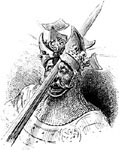
Manipulation, Murder & Madness
VITAL WORKS RECONSIDERED, #36
Macbeth. By William Shakespeare.
Due to publisher restrictions this article is not available on the NOR website. For more information, please see the Crossroad Publishing website.
You May Also Enjoy
The Crypto-Catholic & the Jansenist
Is there such a thing as "Catholic drama"? William Shakespeare and Jean Racine, compared and contrasted, provide two fascinating case studies.
Purgatory on Earth
Dostoyevsky's 'The Idiot' is a profound testament to the power of purgatorial justice and mercy. A lifelong anti-Catholic, he did not connect it to dogma.
On Shakespeare's Supposed Catholicity
What can we say, if anything, about the Bard's religious and political views and how, if at all, are they woven into the plays themselves?

